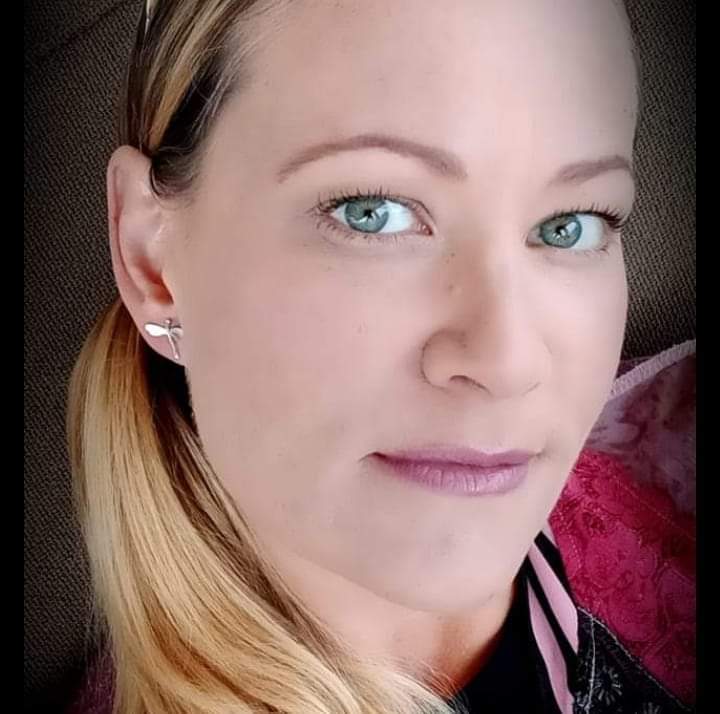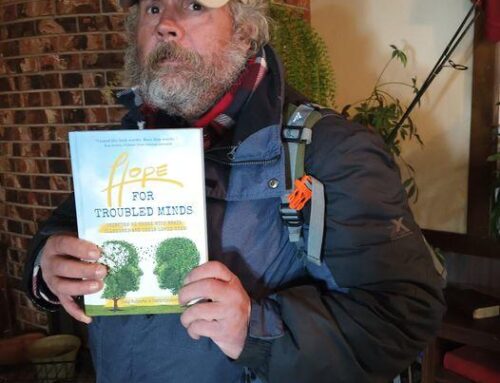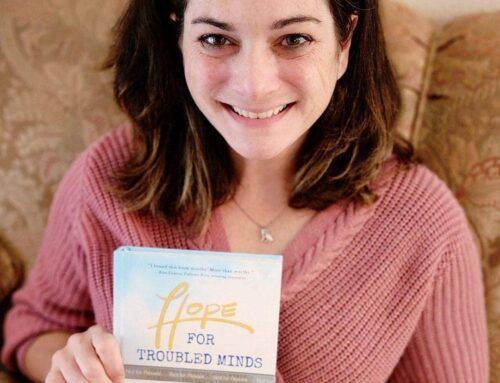Marlene writes:
I grew up in Johannesburg and spent 38 years there. I am a Graphic Designer with a Diploma in Art Direction (Advertising).
My struggle with mental illness began 24 years ago at the age of 16 when I hit my first major depression – the journey to accurate diagnosis, understanding and management has been complex – as with us all.
I am a divorced, single mother and an anti-Child Abuse Activist. My fight in this sphere dropped me onto the radar of some extremely evil people at the end of 2018 and I was forced to lay low for the sake of survival. I had to leave Johannesburg and now live in a picturesque little town on the ‘Garden Route’ in the Western Cape surrounded by rainforests and blue flag beaches. The perfect setting to recover, heal and regain strength for the work that lies ahead.
God has been working in with me in immaculate ways and TOGETHER we are gearing up for something amazing. I am not sure exactly how He is going to use me and my passion for the cause, but I know the time is very close. It has already begun happening, but in no ‘official’ capacity worth mentioning here yet.
How has a nation with little to no resources survived?
The people of South Africa are very unique, but very little is known about us around the world. We are a complex cultural melting pot, to say the least. We have 11 official languages! We have African, European, Coloured, Indian, Arabian / Asian citizens to name but a few. We are the country that entered the world stage when we abolished apartheid in 1994. Our first democratically elected president was Nelson Mandela. Since then we have been dubbed ‘The Rainbow Nation’ and we even got a beautiful, multi-coloured flag to match our bright title.
South Africans are incredibly tough, resourceful, hardworking and friendly people. The bulk of our nation is made up of descendants from people who left their countries around the world to come and make lives for themselves here. This was a harrowing undertaking, no matter whether they were from other African countries or Europe, we all have ‘survival stories’ in our families about our forefathers – I firmly believe that we can ascribe our tenacious nature to these hardcore survivalists.
However, there are many socio-economic and crime related issues:
- Due to extreme corruption, our economy received ‘junk status’ in 2017 – meaning there was nothing to cushion the blow caused by COVID.
- Three of our major cities are listed among the top 50 most dangerous cities in the world.
- We have some of the worst GBV (Gender Based Violence) statistics in the world. A woman is raped every 26 seconds in South Africa – these stats are based on reported cases only. Most go unreported because police do little to nothing about it.
- Our public hospitals are in a terrible state of disrepair.
- We constantly have violent riots because people are desperate for the corrupt ruling party to deliver on their promises, something they can’t do because the money is ‘gone’. Desperate people do crazy things.
Our first reported case of Covid 19 was on 5 March 2020 – it was a husband and wife who contracted it in Italy during a vacation.
We didn’t take this lightly at all – from the onset.
Our first reported case of Covid 19 was on 5 March 2020 – it was a husband and wife who contracted it in Italy during a vacation. We have a total of +/- 57mil citizens, 7.5mil are HIV+ and about 450-thousand people test positive for Tuberculosis annually. Due, mostly to HIV, we have, an estimated, 50 thousand child headed households – children who can’t attend school and have to provide for their siblings / frail parents because the bread winners are dead or dying. These figures don’t account for the elderly and people who have underlying health conditions, for whom COVID could mark certain demise. Our risk for losing a catastrophic portion of our people was and still is, therefore, extremely high. Add to that the fact that our healthcare system and economy is cripple, we now sat with an extremely dire situation.
Level 5 Lockdown officially started on 23 March 2020. You can imagine the panic about the economy, coupled by an intense sense of duty by citizens to protect the ill and elderly and, as with everyone worldwide, the fear and uncertainty we faced. Our lockdown was considered very extreme compared to other nations.
- Our military was immediately deployed to support police in enforcing lockdown.
- Borders were immediately closed and this extended to export and import of non-essential goods which gave our economy its first hard knock – we export fine wines and produce around the world.
- Travel between towns & provinces (states) was banned – so our tourism reliant sectors and picturesque towns were economically crippled. This also meant that many divorced parents could not visit their children for months.
- No walking, running, swimming / surfing in the ocean, hiking, rowing or cycling was allowed – you couldn’t even take your dog for a walk.
- All non-essential businesses were closed – companies and small businesses tried their best to retain and pay their staff, despite earning no income, but many quickly folded, leaving staggering numbers of people unemployed.
Yet, South Africans often laugh in the face of adversity.
Within about 2 weeks we realized we were in an extreme crisis, government was not going to help anyone much:
- NGO’s (from all sectors), religious institutions (all religions), inactive businesses with enough capital to spare and volunteers set up feeding & supply programs in their neighborhoods and towns, feeding and supporting millions of families for free. Many restaurants made their kitchens available, at no charge, for the bulk preparation of food for the needy. Volunteers used their own vehicles to distribute meals and supplies to those who have no transport.
- Neighbors were looking after each other like never before, especially elderly or disabled neighbors, were supported by those around them. Many people who had the means, were doing supply runs for those who don’t or those who are at high risk for contraction like the sick or elderly. People who have literally never spoken before, reached out to each other to help and through that, have created friendships that’ll last forever.
- One will always get rebels, but mostly, South Africans were very good about wearing our masks, sanitizing, social distancing etc. Our focus as a nation was, predominantly, to flatten the curve – so that we could get back to work, earn an income and save our economy – secondly to prevent deaths (this seems back to front, I know, but what point is there being alive if you can’t eat?).
Positivity, silver linings, anarchism for sake of survival.
- We brewed pineapple and ginger hooch. Many of us caused sticky explosions in our kitchens after a few days.
- We got our great grandparent’s stills out the attic, fixed and cleaned them and made mampoer & witblits (moonshine) like they did ‘in the old days’ – I know of families who sold this on the, now bustling, ‘black market’ and used the cash to put food on the table.
- I remember very early on, we had a ‘lockdown video challenge’ that went viral on Facebook. You had to swallow a raw egg, 1 shot of sugar and 1 shot of whatever alcohol you could find (or make) then challenge a friend – afterwards it came to light that it is an old remedy for constipation! The inventor must’ve figured we we’re all full of s#!+! LOL!
- We created countless online support groups where we shared jokes, tips, and could ask for help.
- We homeschooled our kids and gained new respect for the incredibly hard work our teachers do. We cracked countless jokes about this infuriating experience.
- We got our grandmother’s recipe books out the cupboard and learnt how to bake, cook and make preserves properly.
Now at level 1.
- Many many people are still unemployed and many businesses have permanently disappeared, but there is a huge spirit of ‘reinvention’. People who hated what they were doing before are now completely reinventing themselves and starting over doing what they love. There is something beautiful hidden in ‘rock-bottom’ – when one has lost everything. At that point things that previously seemed like a risk now look, tantalizingly, like an opportunity.
- Many businesses realized that they can trust their employees to ‘get the job done’ from home and that they can save overheads by not renting massive buildings. The employees working online are realizing they don’t have to live in dangerous capitals and are moving to safer, idyllic little towns where their children can be surrounded by nature – the little towns are smiling because ‘big city money’ is bolstering their usually, tourism reliant ‘seasonal’ economies.
- People are embracing the outdoors like never before. They are hiking and going to the beach, travelling locally, spending time with their families, spending time at home instead of the pub or club, doing online courses, and continuing with their community volunteer work started in level 5.
Mental Illness and COVID.
I was misdiagnosed with Bipolar Disorder in 2006, I actually have PTSD – I can forgive the doctors, the symptoms are very similar.
- I lost a friend during hard lockdown to suicide – I was her only friend who understood and due to lockdown and her being in a different town, I couldn’t visit her like before. I miss her greatly and I know many of us lost fellow warriors in a similar way in recent months.
- On my side, I oddly thanked mental illness for preparing me. Due to extended periods of depression, I was accustomed to the social isolation that now came with lockdown.
- Due to constant fear and anxiety caused by my MI, I was used to these extreme emotions and over the years have learnt valuable grounding techniques which ‘normal’ people never had to.
- People with MI see the world in technicolor, we notice EVERYTHING and I realized during COVID that this can be recycled into a superpower for good – we are extremely valuable to this world, even if we don’t feel that way.
Conclusion.
Our priorities are looking much healthier now than ever before! We have learnt how good it feels to bake our own bread, love, protect and support our fellow man. Stand together in order to survive. We know how magnificently adaptable God has created us.
A few years ago my Dad had to travel to DRC (Democratic Republic of Congo) for business, a nation who has been in the grip of bloody civil war in very recent history. I feared for his safety. Upon his return he told me that they have very little but that they were the friendliest people and they had incredible pride in what little they had and did what they do to the best of their ability. Their homes were clean, their vegetable gardens lush and they placed high value on relationships and human connection.
Success is not always financial – I think the way we are doing this as citizens and how much we are learning about each other through this process, is true success.
The ‘little things’ matter now, more than ever before.
Discover more from Delight in Disorder
Subscribe to get the latest posts sent to your email.







